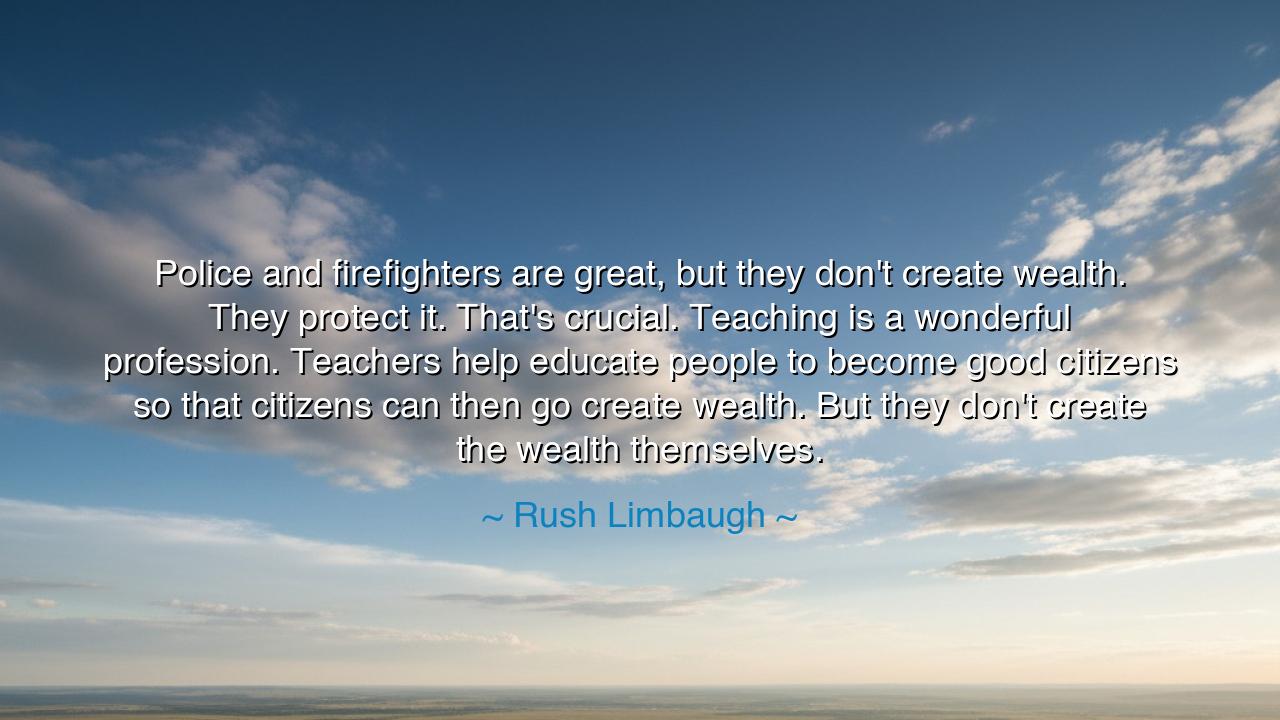
Police and firefighters are great, but they don't create wealth.
Police and firefighters are great, but they don't create wealth. They protect it. That's crucial. Teaching is a wonderful profession. Teachers help educate people to become good citizens so that citizens can then go create wealth. But they don't create the wealth themselves.






Hear now the words of the elder, for they speak of wealth, of protection, and of the sacred labor of teaching. Rush Limbaugh’s saying is not mere rhetoric, but a reflection of how societies stand or fall. He declares: police and firefighters guard the fruits of labor; they do not bring them forth from the earth. They are the shield and the flame-queller, without whom chaos would devour the city. Yet, they do not till the soil nor build the marketplace. Their honor lies in defense, not in creation. This is a truth both humbling and clarifying.
In the same manner, teachers, though exalted, though guides of the mind and awakeners of the soul, are not the smiths of coin nor the builders of commerce. They are the ones who prepare the young for wisdom, civility, and discipline. They teach the mind to wield itself, so that in the fullness of time, citizens may go forth into the world and forge wealth, inventions, and flourishing enterprises. Thus, the quote distinguishes the roles of society: the creator, the protector, and the guide. Each is noble, yet not all are the source of creation.
Consider the tale of the Athenian polis. The philosophers, like Socrates, nurtured thought; the hoplites and guardians defended the walls. But it was the merchants, craftsmen, and farmers who filled the agora with trade, who drew silver from the mines, who built ships to sail the wine-dark sea. Without them, Athens would have no wealth to protect, no schools to fund, no leisure for philosophy. Yet without guardians, raiders would pillage. Without teachers, the people would be coarse and unfit for governance. Thus, all were vital, but their tasks were not the same.
Look also to Rome. The legions conquered, but conquest alone does not feed the city. It was the engineers, the farmers, the traders of olive oil and wine who built the treasury. Cicero taught virtue, the Vestals kept faith, the centurions stood watch—but it was through creation, through labor, through commerce, that wealth flowed into the empire’s veins. And when wealth ceased to be created, when the state lived only to defend and consume, decline followed like winter after autumn.
What, then, is the heart of this teaching? It is this: honor all roles, but do not confuse their essence. Protection is sacred, education is sacred, but creation is the fountain without which the others grow dry. A society that forgets who creates wealth will falter, for it will consume without replenishing, defend without substance, and teach without purpose. The balance of the three must be kept, but the source must be recognized.
Let the lesson pierce the heart: do not scorn the protectors, nor despise the teachers, but understand that wealth—the surplus that feeds families, builds cathedrals, funds armies, and sustains schools—must come from the labor of creation. If you would strengthen your people, strive also to be a maker: till the field, craft the tool, invent the device, begin the enterprise. For only by producing new bounty can a nation remain strong.
Thus, the counsel for each listener: respect the guardians, for they keep chaos at bay. Honor the teachers, for they cultivate the soil of the mind. But do not neglect the path of creation. Seek to build, to innovate, to sow, to multiply what is given into abundance. Whether your field is humble or vast, do not be content only to preserve—be one who creates. For in creation lies the seed of tomorrow’s safety, tomorrow’s wisdom, and tomorrow’s prosperity.






AAdministratorAdministrator
Welcome, honored guests. Please leave a comment, we will respond soon